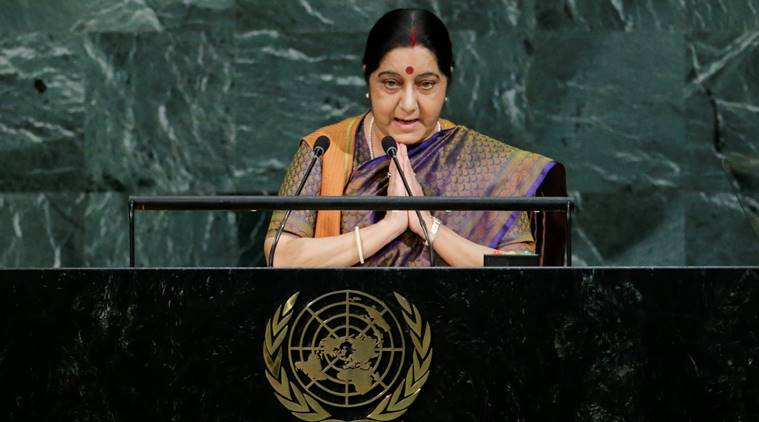Pointing out the glaring difference between the two Asian countries in terms of development, EAM Sushma Swaraj said India has established IITs, IIMs, AIIMS, while Pakistan produced terrorists such as JeM, LeT, and Haqqani network.

Indian External Affairs Minister Sushma Swaraj addresses the 72nd United Nations General Assembly at U.N. headquarters in New York, U.S., September 23, 2017.
In her address to the 72nd UN General Assembly session, External Affairs Minister Sushma Swaraj on Saturday launched a stinging attack on Pakistan and asked its neigbour’s politicians to intropect as to why India is recognised as a global IT superpower while Pakistan is infamous as the “pre-eminent export factory for terror”.
“I would like today to tell Pakistan’s politicians just this much, that perhaps the wisest thing they could do is to look within. India and Pakistan became free within hours of each other. Why is it that today India is a recognised IT superpower in the world, and Pakistan is recognised only as the pre-eminent export factory for terror?” EAM Swaraj asked.
Pointing out the glaring difference between the two Asian countries in terms of development, EAM Swaraj said India has established IITs, IIMs, AIIMS, while Pakistan produced terrorists such as JeM, LeT, and Haqqani network. She also accused Pakistan of waging a war against India and stated that a country that has been the world’s greatest exporter of havoc, death and inhumanity became a champion of hypocrisy by preaching about humanity from this podium. Her comments were in response to Pakistan Prime Minister Shahid Khaqan Abbasi’s speech on Thursday wherein he accused India of violating human rights and state-sponsored terrorism.
“While India is completely engaged in fighting poverty, our neighbour Pakistan is fighting us,” Swaraj said. Replying to the accusations levelled by Abbasi, Swaraj said that all those listening to the PM had only one reaction, “Look Who is talking.”
Speaking in Hindi at the UNGA, Swaraj said,”PM Abbasi has recalled old resolutions that have been long overtaken by events. But his memory has conveniently failed him where it matters. He has forgotten that under the Shimla agreement and the Lahore Declaration India and Pakistan resolved that they would settle outstanding disputes bilaterally.”
Calling on the UN countries to reach an agreement on comprehensive Convention on International Terrorism, Swaraj urged member nations to stop seeing terrorism as self-defeating and meaningless nuance. Although India proposed a Comprehensive Convention on International Terrorism (CCIT) as early as in 1996, the United Nations has still not been able to agree on a definition of terrorism.
Swaraj also said terrorism is at the very top of problems for which the United Nations is searching for solutions. “If we cannot agree to define our enemy, how can we fight together? If we continue to differentiate between good terrorists and bad terrorists, how can we fight together? If even the United Nations Security Council cannot agree on the listing of terrorists, how can we fight together?” she added.
“The fact is that when we are required to fight and destroy this enemy, the self-interest of some leads them towards duplicity,” she added, Swaraj was apparently referring to China, a veto-wielding permanent member of the Security Council, which has repeatedly blocked India’s move to put a ban on Jaish-e-Mohammed chief Masood Azhar under the Al-Qaeda Sanctions Committee of the Council. The JeM has already been on the banned list.
She also pointed out that demonetisation was a “courageous” decision taken by Prime Minister Narendra Modi to challenge one of the by-products of corruption-the black money. “Demonetisation was a courageous decision to challenge one of the by-products of corruption, the ‘black money’ that disappeared from circulation,” Swaraj said.
With the world witnessing a massive change in climate and environment, Swaraj stressed that the issue of climate change requires more “serious action than talks.” Referring to her last year’s address to the UNGA, Swaraj said she had identified climate change as “one of the significant dangers to our” existence. “India has already said that it is deeply committed to the Paris Accord. This is not because we are afraid of any power, influenced by friend or foe, or tempted by some imagined greed,” the External Affairs Minister said.
Swaraj also pointed out that the developed countries must listen more carefully than others because they have more capacities than others. The minister urged nations to help developing countries through technology transfer and green climate financing to counter the menace of climate change. “We must learn to live with the imperatives, cycles and creative urges of nature; in that lies, our own salvation,” she observed.
At the UNGA, Sushma Swaraj expressed that the revamp of the United Nations Security Council will be a top priority for the UN. “Efforts at text-based negotiations on the reform and expansion of the Security Council were initiated in the last session and more than 160 nations had expressed support for this effort. If we are serious, then the least we can do is produce one text that can be the basis for negotiation,” Swaraj said addressing the UN for the second consecutive year.
India has been calling for the reform of the Security Council for a long time. India also received support from several other multilateral groupings during the current UN General Assembly session in this regard, including BRICS and IBSA
 Share
Share





0 comments:
Post a Comment